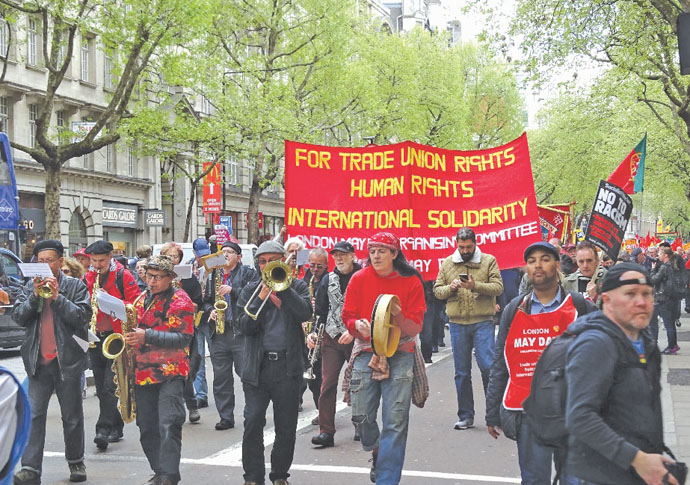Unions focus on transport & workplace
Thousands join May Day march through West End to Trafalgar Square
Friday, 3rd May 2024 — By Daisy Clague

TRADE unions and workers marched in their thousands through the West End to celebrate May Day in a mark of solidarity with people struggling at home and abroad.
The International Workers’ Day campaign sang historic socialist anthems as they gathered at Clerkenwell Green before marching to Trafalgar Square.
Union heavyweights Mick Lynch, the National Union of Rail, Maritime and Transport Workers secretary-general, and Matt Wrack, the Trades Union Congress president were among the speakers.
Many marchers voiced similar sentiments as well as desire to return transport to public hands, and the need to hold the government to account on workers’ rights, regardless of which party is in power.
Mr Lynch told Extra: “We need a public transport system that is cheap, affordable, safe and accessible. We need policies that make people want to use public transport as a default, and that means putting transport into public hands.”
He said nationalising public transport must be a cornerstone of green policy for any future government, and added: “Whether it’s this government or a Labour government, we have to keep campaigning. When we have a Labour government we need a stronger labour movement, not a weaker one. We’ve got to put this Labour government under a lot of pressure, politically, culturally, and through industrial action.”
Labour pledged to bring rail contracts back into public ownership last week, although the full detail on how easy the transfer would be has yet to be hammered out.
Lois Austin, London and south east regional secretary for the PCS, Public and Commercial Services Union, which represents a range of professions in publicly-funded bodies, said: “Our rights have been eroded over many years by the Conservative government. Our members’ pay has been devalued by about 20 per cent since the financial crisis. We’ve got members working for the Department for Work and Pensions who have to claim the benefits they administer, so there’s real poverty among civil servants.”
Ms Austin added: “We need investment into green jobs and public transport, but the government needs to help people working in carbon-heavy industries to move into carbon-neutral employment. It can only be done with government intervention and planning. We always say you need to be red to be green, and you really do.”
Solidarity with migrant workers in the UK was another recurring message.
Khadija Najlaoui, a former domestic worker and Unite representative, who coordinates a migrant workers’ education programme, said: “Language can be a big barrier.
“When people come to the UK, they cannot fight for their rights if they don’t speak English. And if an employer knows they don’t speak English, it is easier for them to bully and exploit them.”
Ms Najlaoui learnt English through the same Unite programme she now coordinates, having arrived in the UK in 2007 not knowing a word.
Members of the Filipino Domestic Workers Association also took part in the march, calling on the government to reinstate rights for migrant domestic workers that were revoked in 2012.
Migrant domestic workers in the UK today do not have the right, for example, to change employers in cases of abuse.
FDWA chair Cielo Tilan said: “Our members are survivors of modern slavery.
“Here in the UK there is no domestic work visa. Domestic work is not seen as work.”